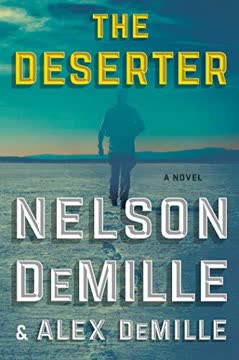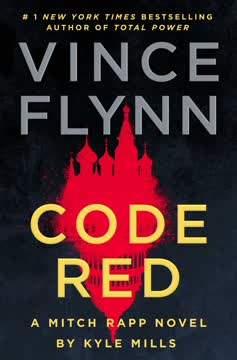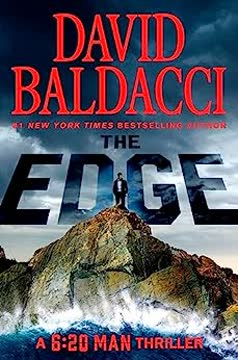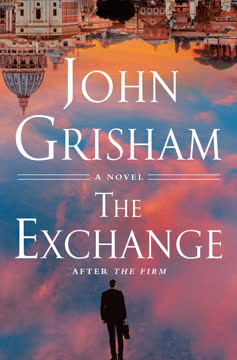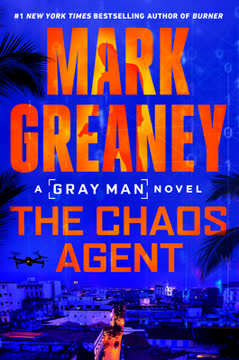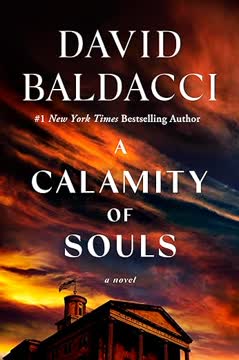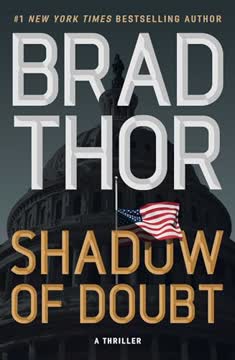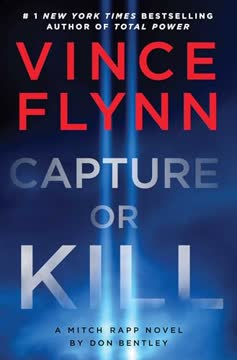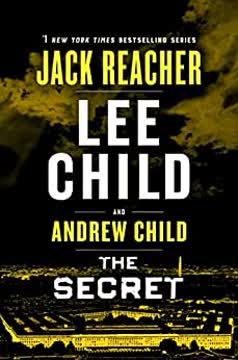Plot Summary
Desertion in the Night
Captain Kyle Mercer, a highly trained Delta Force officer, disappears from his remote outpost in Afghanistan under mysterious circumstances. His desertion is a shock to the military, not only because of his elite status but also because it occurs in a war zone, raising fears of defection, capture, or betrayal. The Army's worst fears are realized when the Taliban releases a video of Mercer as their prisoner, demanding a prisoner exchange. Mercer's silence and stoic demeanor in the video only deepen the mystery. After years in captivity, Mercer escapes, leaving behind a gruesome scene of dead Taliban, and vanishes into the world, his motives and loyalties unclear.
Army Cops on the Case
Chief Warrant Officer Scott Brodie and his new partner, Warrant Officer Maggie Taylor, both Army Criminal Investigation Division (CID) agents, are tasked with finding and apprehending Mercer. Brodie is a seasoned, irreverent investigator with a combat background; Taylor is sharp, driven, and has her own scars from Afghanistan. Their assignment comes from the highest levels, with strict orders: find Mercer, bring him back alive, and avoid a media circus. The Army wants answers—and justice—but also wants to avoid embarrassment. The partners' dynamic is tested as they prepare for a mission that will take them far from the safety of Quantico.
The Mercer Mystery Deepens
As Brodie and Taylor dig into Mercer's background, they find a man who was the model soldier—until he wasn't. His file is full of redactions, and his Delta teammates are unreachable. The Army's official story is full of euphemisms and spin, and the partners sense that Mercer's desertion is more than a simple case of cowardice or trauma. The case is complicated by the deaths of two soldiers during the search for Mercer, and by the Army's reluctance to call him a deserter publicly. The partners are briefed on classified footage of Mercer's escape, which shows him killing his captors with chilling efficiency and resigning his commission on camera. The Army refuses to accept his resignation.
Orders from the Top
A tip places Mercer in Caracas, Venezuela, a country in chaos and hostile to U.S. interests. Brodie and Taylor are ordered to go undercover, locate Mercer, and extract him by any means necessary. They are warned that Venezuela is lawless, that the U.S. embassy can offer little help, and that the mission is strictly off the books. Their cover is thin, and the risks are high—not just from Mercer, but from the criminal and political forces that rule Caracas. The partners are given new identities, cash, and a contact at the embassy, Colonel Worley, who is more spook than soldier and has his own agenda.
Partners with Baggage
As they prepare for the mission, Brodie and Taylor's backgrounds and personalities come into sharper focus. Brodie is haunted by his time in Iraq and his outsider status in the Army. Taylor, a Civil Affairs veteran from Afghanistan, carries physical and psychological wounds, and her past includes a complicated relationship with a CIA officer. Their partnership is uneasy, marked by mutual respect, banter, and underlying tension. Both are skilled investigators, but each has secrets and doubts about the other's loyalties and motivations. The mission will test not only their professional abilities but also their trust in each other.
The Caracas Assignment
Brodie and Taylor land in Caracas, navigating a gauntlet of corrupt officials, shakedowns, and a city teetering on collapse. They are met by Luis, a local driver with ties to the embassy, and briefed by Colonel Worley, who provides them with weapons, cash, and advice: trust no one, avoid the police, and don't expect help if things go wrong. The partners begin their investigation, following a lead from an old Army buddy who claims to have seen Mercer in a brothel. The city's poverty, violence, and paranoia are palpable, and the partners must rely on their wits and each other to survive.
Into the Venezuelan Underworld
Their investigation takes them into the slums of Petare, one of the world's most dangerous neighborhoods, controlled by gangs and colectivos loyal to the regime. Brodie and Taylor pose as tourists and follow the trail to a network of brothels, where underage girls are trafficked and powerful men indulge their vices. They encounter corrupt National Guard soldiers, ruthless gangsters, and a population struggling to survive. The partners' cover is thin, and every encounter could turn deadly. They learn that Mercer is not just hiding—he is involved with the local power structure, possibly running or protecting criminal enterprises.
The Brothel Lead
A key witness, a former Army buddy, admits he saw Mercer in a notorious brothel that caters to the powerful and the depraved. Brodie and Taylor track down the brothel, navigating layers of lies, danger, and moral compromise. They discover that Mercer is more than a fugitive—he is a player in the city's underworld, connected to both the regime and the opposition. The partners' investigation puts them in the crosshairs of both criminals and the authorities, and they must decide how far they are willing to go to get their man. The line between justice and survival blurs.
Dangerous Games in Petare
Brodie and Taylor's pursuit leads to a violent confrontation in the brothel, where they are forced to fight their way out, leaving a trail of bodies and making powerful enemies. Their actions draw the attention of SEBIN, the Venezuelan intelligence service, and the regime's enforcers. The partners realize they have been set up, possibly by their own side, and that Mercer is always one step ahead. Their only hope is to follow a new lead into the jungle, where Mercer is rumored to have established a camp. The mission becomes a race against time, with Brodie and Taylor hunted by both the regime and their own government.
The Jungle Connection
The partners charter a plane and travel to the remote village of Kavak, deep in the Venezuelan jungle. There, they learn that Mercer is running a paramilitary camp, training men for the regime and possibly for his own purposes. The camp is a lawless outpost, a mix of mercenaries, criminals, and indigenous people. Brodie and Taylor are captured and held as prisoners, facing torture, death, or worse. They discover that Mercer's motives are complex—he is driven by betrayal, revenge, and a twisted sense of justice. The partners must use all their skills to escape and turn the tables on their captors.
The Truth About Mercer
In captivity, Brodie and Taylor confront Mercer, who reveals the truth behind his desertion and his actions since. Mercer was recruited into a secret program—Flagstaff—modeled on the CIA's Phoenix Program, tasked with pacifying Afghan villages through assassination and terror. Betrayed by his superiors, especially Colonel Worley, and left to take the fall, Mercer deserted to expose the program but was captured by the Taliban. His years in captivity broke and remade him, and his return is driven by a desire for revenge against those who used and abandoned him. The partners realize they are pawns in a much larger game.
The Jungle Camp
Brodie and Taylor manage a daring escape, killing their captor and taking Mercer prisoner. They trek through the jungle, pursued by Mercer's men and racing against time to reach a clandestine airstrip where an extraction plane—arranged by Worley—will take them out. The journey is grueling, testing their endurance, trust, and resolve. Mercer alternates between defiance and resignation, and the partners must decide whether to bring him back alive or leave him to his fate. The jungle becomes a crucible, burning away illusions and forcing each character to confront their own guilt, loyalty, and sense of justice.
Escape and Evasion
At the airstrip, Brodie and Taylor are met not by rescue but by betrayal. Colonel Worley arrives with armed men, intending to kill Mercer and silence the partners to protect himself and the secrets of Flagstaff. In a final, violent confrontation, Mercer helps turn the tables, sacrificing himself to ensure Worley's death and the partners' escape. Brodie and Taylor survive, but at great cost. The truth about Mercer, Flagstaff, and the Army's complicity is now in their hands, but justice remains elusive. The partners are left to reckon with what they have done, what they have learned, and what it means to serve.
The Final Confrontation
Back in the world, Brodie and Taylor must report what happened, knowing that the Army and the intelligence community will do everything possible to bury the truth. The case of Kyle Mercer is officially closed, but the questions it raised—about loyalty, betrayal, the morality of war, and the price of secrets—linger. Brodie and Taylor's partnership, forged in danger and tested by betrayal, endures, but both are changed. The story ends with the recognition that justice is complicated, that the truth is dangerous, and that the scars of war—physical and moral—never fully heal.
Characters
Scott Brodie
Brodie is a Chief Warrant Officer in the Army CID, a combat veteran of Iraq, and a man who has seen the best and worst of war. He is sharp, cynical, and often insubordinate, with a dark sense of humor and a deep sense of justice. Brodie's outsider status in the Army gives him perspective but also makes him a target for bureaucratic suspicion. He is driven by a need to find the truth, even when it puts him at odds with his superiors. His partnership with Taylor is both a source of strength and tension, as he struggles with trust, attraction, and the burden of command. Brodie's journey is one of reckoning—with his own past, with the Army's secrets, and with the meaning of justice in a world where the lines are blurred.
Maggie Taylor
Taylor is a Warrant Officer, former Civil Affairs specialist, and Brodie's partner in the CID. She is intelligent, determined, and marked by her experiences in Afghanistan, where she was wounded and traumatized by the moral ambiguities of war. Taylor's past includes a relationship with a CIA officer, which complicates her loyalties and her sense of self. She is both attracted to and frustrated by Brodie, and their partnership is a dance of mutual respect, banter, and unspoken feelings. Taylor's arc is one of self-forgiveness and moral clarity—she seeks redemption for her own compromises and is determined to do the right thing, even when it is dangerous or unpopular.
Kyle Mercer
Mercer is a former Delta Force captain, once the Army's golden boy, now its most wanted deserter. His desertion is rooted in betrayal—he was recruited into a secret assassination program, Flagstaff, and abandoned by his superiors when things went wrong. Years of captivity by the Taliban have left him physically and psychologically scarred, and his return is driven by a desire for revenge against those who used and discarded him. Mercer is both victim and perpetrator, capable of great violence and moments of compassion. His relationship with Brodie and Taylor is complex—he sees in them both the possibility of justice and the inevitability of betrayal. Mercer's fate is a meditation on the costs of war and the impossibility of coming home.
Brendan Worley
Colonel Worley is the Army attaché in Caracas, but his real role is as a Defense Intelligence Agency operative with deep ties to the CIA and the world of covert operations. He is charming, slippery, and ruthless, more comfortable in the shadows than in uniform. Worley is both ally and antagonist to Brodie and Taylor, providing them with resources while steering them away from the truth. He is implicated in the creation and cover-up of Flagstaff, and his primary goal is self-preservation. Worley's psychological complexity lies in his ability to rationalize any action as being for the greater good, even as he betrays those around him.
Luis
Luis is a Venezuelan driver and fixer, hired by Brodie and Taylor for their mission in Caracas. He is brave, adaptable, and motivated by the hope of a better life for his family. Luis becomes an essential partner, navigating the dangers of the city and the jungle, and risking everything to help the Americans. His relationship with Brodie and Taylor is one of mutual respect and growing trust, and his fate is a reminder of the collateral damage inflicted on ordinary people by the games of the powerful.
Colonel Dombroski
Dombroski is Brodie and Taylor's boss at CID, a career officer caught between the demands of justice and the realities of Army politics. He is supportive but cautious, aware that the Mercer case is a political minefield. Dombroski's relationship with Brodie is paternal and exasperated—he recognizes Brodie's talent but fears his recklessness. Dombroski's arc is one of reluctant complicity—he wants to do the right thing but is constrained by the system.
General Hackett
Hackett is the Provost Marshal General, the Army's top cop, more concerned with optics and public relations than with the messy realities of justice. He is the one who gives Brodie and Taylor their orders, but he is quick to distance himself when things go wrong. Hackett represents the institutional desire to control the narrative, even at the expense of truth.
Carmen
Carmen is a prostitute in Caracas who becomes a key witness in the search for Mercer. She is streetwise, resilient, and unexpectedly compassionate, providing Brodie and Taylor with crucial information about Mercer's activities and the location of his jungle camp. Carmen's story is a window into the suffering and exploitation of the powerless, and her courage in helping the partners is a small act of resistance against the forces that use and discard people like her.
Emilio
Emilio is one of Mercer's lieutenants in the jungle camp, a man shaped by violence and accustomed to power. He is both a product and an agent of the lawlessness that defines the camp, and his interactions with Brodie and Taylor are marked by cruelty and menace. Emilio's fate is a reminder of the thin line between order and chaos in places where the law does not reach.
Trent
Trent is Taylor's former lover and a CIA officer involved in the Flagstaff program. He is charming, persuasive, and ultimately self-serving, using Taylor for information and then threatening her with exposure when things go wrong. Trent embodies the moral ambiguity of intelligence work, where ends justify means and personal relationships are tools to be exploited.
Plot Devices
Dual Protagonists and Shifting Perspectives
The novel alternates between Brodie and Taylor's perspectives, allowing readers to see the investigation and its moral dilemmas from different angles. This duality creates tension, reveals secrets, and deepens the psychological complexity of the story. The shifting perspectives also highlight the differences in their backgrounds, values, and approaches to justice, making their partnership both a source of strength and conflict.
The Fugitive as Mirror and Foil
Kyle Mercer is not just a target but a psychological mirror for Brodie and Taylor. His journey from hero to deserter to warlord forces the protagonists to confront their own compromises, traumas, and capacity for violence. Mercer's story is a cautionary tale about what happens when loyalty is betrayed and the system fails its best people.
The Jungle as Crucible
The Venezuelan jungle is more than a backdrop—it is a crucible that strips away civilization and exposes the characters' true selves. The jungle sequences heighten suspense, force the characters into survival mode, and create opportunities for both physical and moral testing. The isolation and danger of the setting amplify the stakes and the sense of being abandoned by the institutions they serve.
Conspiracy and Cover-Up
The plot is driven by the uncovering of a secret assassination program (Flagstaff) and the efforts of powerful men to cover it up. Foreshadowing is used through redacted files, evasive superiors, and the presence of intelligence operatives with hidden agendas. The partners' investigation is constantly undermined by those who should be helping them, creating a sense of paranoia and uncertainty.
Moral Ambiguity and the Cost of Justice
The novel uses the investigation as a vehicle to explore the moral ambiguities of war, loyalty, and justice. The protagonists are forced to make choices that compromise their ideals, and the resolution is bittersweet—justice is served, but at a cost. The use of confessions, confrontations, and shifting alliances keeps the reader guessing about who can be trusted and what the right thing to do really is.
Analysis
The Deserter is more than a military thriller—it is a psychological exploration of what happens when the institutions meant to protect and honor their best people instead use, betray, and discard them. Through the intertwined journeys of Brodie, Taylor, and Mercer, the novel interrogates the meaning of duty, the price of secrets, and the impossibility of returning home unchanged. The jungle setting serves as both a literal and metaphorical crucible, burning away illusions and forcing each character to confront their own complicity and capacity for violence. The book is unflinching in its portrayal of the costs of war—not just in lives lost, but in souls broken and ideals compromised. In the end, justice is messy, truth is dangerous, and survival comes at a price. The Deserter asks whether redemption is possible, and whether the truth can ever really set us free.
Last updated:
FAQ
0. Synopsis & Basic Details
What is The Deserter about?
- Elite Soldier Vanishes: The Deserter follows CID agents Scott Brodie and Maggie Taylor as they hunt for Captain Kyle Mercer, a decorated Delta Force officer who mysteriously vanished from his Afghan outpost and later appeared in a Taliban hostage video, only to escape and disappear again.
- Global Manhunt Unfolds: The investigation leads Brodie and Taylor to Caracas, Venezuela, a city gripped by political and economic chaos, where Mercer is rumored to be involved in a shadowy underworld, forcing the agents to navigate corruption, violence, and moral ambiguities.
- Unraveling a Deeper Conspiracy: What begins as a mission to apprehend a fugitive quickly escalates into a complex conspiracy involving black ops, government betrayal, and personal revenge, pushing Brodie and Taylor to question their loyalties and the true meaning of justice.
Why should I read The Deserter?
- Gripping Moral Ambiguity: Dive into a military thriller that transcends simple good vs. evil, exploring the psychological toll of war and the blurred lines of loyalty when institutions betray their own, making The Deserter a compelling read.
- Intense Action & Detective Work: Experience a relentless pursuit across a vividly rendered, chaotic Venezuela, blending DeMille's signature blend of procedural detail, high-stakes action, and cynical humor, keeping readers on the edge of their seats.
- Complex Character Study: Engage with deeply flawed yet compelling protagonists, Scott Brodie and Maggie Taylor, whose personal demons and evolving relationship add rich emotional depth to a story about a deserter who is both victim and perpetrator.
What is the background of The Deserter?
- Venezuela's Collapse as Backdrop: The novel is set against the real-world backdrop of Venezuela's severe political and economic crisis in 2018, depicting hyperinflation, food shortages, rampant crime, and a government hostile to U.S. interests, creating a palpable sense of danger and desperation.
- Shadows of U.S. Black Ops: The narrative delves into the controversial history of U.S. covert operations, particularly referencing the CIA's Phoenix Program in Vietnam and its fictionalized Afghan counterpart, "Flagstaff," highlighting the moral compromises and long-term consequences of such tactics.
- Military Justice vs. Covert Agendas: The story explores the tension between the U.S. Army's Uniform Code of Military Justice and the clandestine operations of intelligence agencies, where the pursuit of national security can lead to the betrayal of soldiers and the suppression of truth.
What are the most memorable quotes in The Deserter?
- "Do What Has to Be Done.": This CID motto, appearing early in Chapter 2, encapsulates Brodie's pragmatic and often ruthless approach to his work, serving as both a guiding principle and a justification for morally ambiguous actions throughout the novel.
- "The truth, Mr. Brodie, can not only be uncomfortable. It can be fatal.": Colonel Dombroski's chilling warning in Chapter 33 foreshadows the dangerous revelations about Operation Flagstaff and the lengths to which powerful entities will go to bury inconvenient truths, highlighting a central theme in The Deserter.
- "I am a soldier. I have not been broken. Not by the Taliban, and not by people like Brendan Worley.": Kyle Mercer's defiant declaration in Chapter 44 reveals his enduring warrior identity despite immense trauma, underscoring his complex Kyle Mercer motivations and his transformation into a vengeful figure.
What writing style, narrative choices, and literary techniques does Nelson DeMille use?
- First-Person, Cynical Narration: The novel primarily employs Scott Brodie's first-person perspective, characterized by his sardonic wit, irreverent observations, and dark humor, which often serves as a coping mechanism against the grim realities he faces. This narrative choice provides immediate access to Brodie's internal conflicts and sharpens the story's cynical tone.
- Procedural Detail & Realistic Action: DeMille meticulously details military and investigative procedures, from CID protocols to combat tactics and intelligence tradecraft, grounding the high-octane action in a sense of authenticity. The literary technique of extensive procedural exposition enhances the realism of the military thriller genre.
- Dialogue-Driven Exposition & Banter: The narrative heavily relies on sharp, often witty dialogue to advance the plot, reveal character, and explore thematic complexities. The constant banter between Brodie and Taylor, and Brodie's provocative exchanges with superiors and suspects, serve as a literary device to convey information and build tension while maintaining an engaging pace.
1. Hidden Details & Subtle Connections
What are some minor details that add significant meaning?
- Maduro's Crooked Portrait: In Chapter 11, Brodie observes a crooked portrait of President Maduro in a customs office, recalling a German expat's comment about Assad's portrait in Damascus: "everyone fears Assad enough to hang his picture, but does not love him enough to straighten it." This subtle detail symbolizes the regime's precarious hold on power and the populace's underlying resentment, hinting at Venezuela's instability.
- Mercer's Stolen Shoes: In Chapter 1, Kyle Mercer takes leather loafers from his dying captive, noting they are "better than the sandals he'd taken off the last guy he killed." This seemingly minor detail foreshadows Mercer's complete moral detachment and resourcefulness, showing his descent into a primal survivalist mentality where even small comforts are plundered from the dead.
- The Tower of David's History: The "Finance Center" (Chapter 18) is revealed to be the Tower of David, an unfinished skyscraper turned vertical slum, later cleared by the government. This location significance subtly reflects Venezuela's failed ambitions and the regime's heavy-handed control, transforming a symbol of progress into one of decay and oppression, mirroring the country's broader decline.
What are some subtle foreshadowing and callbacks?
- Brodie's Mule Shooting: The initial, seemingly trivial inquiry into Brodie shooting a mule (Chapter 2) serves as a callback to his unconventional methods and willingness to bend rules, subtly foreshadowing his later reckless actions in Caracas and the jungle, where his "do what has to be done" ethos leads to significant collateral damage.
- "The Fog of War": Brodie's internal reflection on the "fog of war" (Chapter 34) and the difficulty of discerning truth in combat directly foreshadows Kyle Mercer's later confession about his desertion, revealing how paranoia and conflicting orders led him to make a desperate, life-altering decision. This thematic echo highlights the psychological toll of combat.
- Worley's "Cleaning Up the Shit": Colonel Worley's self-description as someone who "cleans up the shit" (Chapter 26) subtly foreshadows his role in the Flagstaff program and his ultimate attempt to eliminate Mercer and Brodie/Taylor. This character motivation analysis reveals his pragmatic ruthlessness and commitment to covering up inconvenient truths, even at the cost of lives.
What are some unexpected character connections?
- Taylor's CIA Ex-Lover, Trent: Maggie Taylor's past relationship with Trent, a CIA PSYOPs guy involved in the "Flagstaff" program (Chapter 34), is an unexpected character connection that directly links her to the conspiracy Mercer was trying to expose. This revelation complicates her loyalties and provides a personal stake in uncovering the truth about the black ops program.
- General Gomez's U.S. Training: General Ricardo Gomez, a Venezuelan general and Mercer's contact, is revealed to have received junior officer leadership training at Fort Benning (Chapter 33). This character background creates an ironic mirrored relationship where a U.S.-trained officer now actively works against American interests, highlighting the unpredictable outcomes of foreign military aid and the shifting allegiances in a volatile region.
- Luis's Nephew's Death: Luis, the loyal driver, reveals his nephew was killed in anti-government protests (Chapter 12), establishing a deep personal character connection to the regime's brutality. This detail transforms him from a mere logistical asset into a morally invested ally, whose willingness to risk his life for Brodie and Taylor is fueled by a desire for justice against the very forces Mercer is now aiding.
Who are the most significant supporting characters?
- Luis, the Moral Compass: More than just a driver, Luis embodies the suffering and resilience of the Venezuelan people, his personal tragedy (nephew's death) providing a moral counterpoint to the cynical machinations of the military and intelligence agencies. His loyalty and bravery, despite immense personal risk, highlight the human cost of the country's collapse and the mission's impact on ordinary lives.
- Carmen, the Unwitting Oracle: The prostitute Carmen, Mercer's "special lady" (Chapter 30), is crucial for providing the precise intelligence about Mercer's jungle camp. Her detailed, albeit streetwise, testimony is the linchpin of Brodie and Taylor's pursuit, demonstrating how vital information can come from the most unexpected and marginalized sources in a morally compromised world.
- Ted Haggerty, the Sacrificial Lamb: Ted Haggerty, the CIA officer captured and killed by Mercer (Chapter 37), serves as a direct, tragic link between Worley's intelligence operations and Mercer's revenge. His fate underscores the brutal stakes of the Flagstaff cover-up and foreshadows the danger awaiting Brodie and Taylor, revealing the ruthlessness of both Mercer and the intelligence community.
2. Psychological, Emotional, & Relational Analysis
What are some unspoken motivations of the characters?
- Worley's Self-Preservation: Colonel Worley's consistent efforts to dissuade Brodie and Taylor from pursuing Mercer, and his attempts to control their information flow, are driven by an unspoken motivation to protect himself and the Flagstaff program from exposure. His actions are a calculated Brendan Worley motivation analysis to prevent a public scandal that would ruin his career and potentially lead to legal repercussions.
- Taylor's Quest for Absolution: Maggie Taylor's intense dedication to the mission and her willingness to confront Mercer, even at great personal risk, are subtly motivated by a desire for absolution for her unwitting complicity in Operation Flagstaff. Her confession to Brodie (Chapter 34) reveals a deep-seated guilt, making her pursuit of justice a personal journey for redemption and moral clarity.
- Mercer's Twisted Sense of Honor: Kyle Mercer's decision to spare Al Simpson and Carmen, despite the risk they posed as witnesses, is driven by a complex, unspoken sense of honor or perhaps a desire for his story to be told. His later act of disemboweling Carmen's rapist (Chapter 30) further illustrates a warped moral code, where he protects those he deems innocent while ruthlessly punishing perceived betrayals, offering a deeper Kyle Mercer motivations explained.
What psychological complexities do the characters exhibit?
- Mercer's Moral Injury and Megalomania: Kyle Mercer exhibits profound psychological complexities, stemming from moral injury sustained during Flagstaff and two years of Taliban captivity. His transformation into "Señor Kyle," a jungle warlord who believes "the law of the jungle is me" (Chapter 44), showcases a descent into megalomania and a twisted form of justice, where personal revenge becomes his sole driving force.
- Brodie's Cynical Idealism: Scott Brodie grapples with a cynical exterior that masks a deep-seated idealism and commitment to justice. His irreverent humor and rule-breaking tendencies are a coping mechanism for the moral compromises he witnesses, but his relentless pursuit of truth, even when ordered to stop, reveals a profound psychological complexity rooted in his own combat trauma and a desire for accountability.
- Taylor's Conscience and Resilience: Maggie Taylor's psychological complexities are evident in her struggle to reconcile her past actions in Afghanistan with her current moral compass. Her initial reluctance to reveal her CIA connection, followed by her courageous confession and unwavering resolve in the face of danger, highlights her journey from unwitting complicity to fierce advocacy for justice, demonstrating remarkable resilience.
What are the major emotional turning points?
- Taylor's Mirabad Confession: A major emotional turning point occurs in Chapter 34 when Maggie Taylor tearfully recounts the Mirabad massacre and her unwitting role in Operation Flagstaff. This raw confession reveals her deep moral injury and guilt, transforming her relationship with Brodie from professional to deeply personal, and solidifying their shared purpose against the conspiracy.
- Mercer's Flagstaff Revelation: Kyle Mercer's detailed, angry recounting of his betrayal by Worley and his forced participation in the "pacification" program (Chapter 44) is a pivotal emotional turning point. It shifts the reader's perception of him from a simple deserter to a deeply wronged individual, explaining his rage and setting the stage for his ultimate act of revenge and sacrifice.
- Brodie's Decision to Take Mercer Alive: Despite Mercer's horrific crimes and the immense danger, Brodie's internal struggle and ultimate decision to take Mercer alive (Chapter 46) marks a significant emotional turning point. This choice, influenced by Taylor's moral stance, reaffirms his commitment to due process over summary execution, even in the face of overwhelming temptation for rough justice.
How do relationship dynamics evolve?
- Brodie and Taylor: From Colleagues to Confidantes: The relationship dynamics between Scott Brodie and Maggie Taylor evolve significantly, starting as a professional partnership marked by banter and underlying tension, then deepening into mutual trust and emotional intimacy after Taylor's confession about Flagstaff. Their shared trauma and commitment to justice forge an unbreakable bond, hinting at a future beyond their professional roles.
- Brodie and Dombroski: Trust Under Pressure: Brodie's relationship with Colonel Dombroski, initially characterized by insubordination and exasperation, transforms into a complex dynamic of trust under extreme pressure. Dombroski, despite his caution, ultimately relies on Brodie's instincts and allows him to pursue the truth, even when it means defying higher authority, showcasing a nuanced relationship analysis.
- Mercer and Worley: A Vengeful Obsession: The core relationship dynamic driving much of the plot is the deadly cat-and-mouse game between Kyle Mercer and Brendan Worley. Fueled by Mercer's profound sense of betrayal and Worley's ruthless self-preservation, their conflict escalates into a personal vendetta, culminating in a fatal confrontation that underscores the destructive power of unresolved grievances.
4. Interpretation & Debate
Which parts of the story remain ambiguous or open-ended?
- The Full Extent of Flagstaff's Reach: While Mercer and Taylor expose the existence of Operation Flagstaff, the novel leaves ambiguous the full scope of the program, its ultimate architects, and how many other "Mirabads" occurred. This ambiguity highlights the pervasive nature of covert operations and the difficulty of uncovering truth within powerful, secretive institutions.
- Brodie and Taylor's Post-Mission Future: The ending leaves the professional and personal future of Brodie and Taylor open-ended. Their defiance of orders and the sensitive nature of their discoveries suggest potential career repercussions, while their burgeoning emotional connection remains unresolved, prompting interpretive debate about their long-term prospects within or outside the Army.
- Luis's Asylum Claim: The fate of Luis and his family's asylum claim in the U.S. is left uncertain, despite Brodie's efforts to secure their passage. This open-ended plot point underscores the precariousness of life for those caught in geopolitical conflicts and the often-unfulfilled promises made by powerful nations to their local allies.
What are some debatable, controversial scenes or moments in The Deserter?
- The Hen House Shootout: The violent confrontation in the Hen House (Chapter 31), where Brodie and Luis kill multiple individuals, including regime officials and gang members, is a highly controversial scene. It raises interpretive debate about the justification of lethal force in a foreign country, Brodie's adherence to military rules of engagement, and the moral cost of achieving the mission in a lawless environment.
- Taylor's Strip Search by Emilio: Maggie Taylor's forced strip search by Emilio (Chapter 45) is a debatable moment that highlights the vulnerability of prisoners and the pervasive threat of sexual violence in such settings. Brodie's initial internal struggle and later rage, coupled with Taylor's pragmatic response, provoke discussion on gender dynamics in combat zones and the psychological impact of such dehumanizing acts.
- Mercer's "Pacification" Actions: Kyle Mercer's detailed confession about his participation in the "pacification" of Afghan villages (Chapter 44), involving the killing of unarmed civilians, is a deeply controversial scene. This analysis forces readers to confront the moral abyss of war crimes, the concept of "following orders," and the psychological damage inflicted on soldiers by morally corrupt commands.
The Deserter Ending Explained: How It Ends & What It Means
- Mercer's Sacrifice and Worley's Demise: The The Deserter ending explained culminates in a violent confrontation at the jungle airstrip. Colonel Worley arrives to eliminate Mercer and silence Brodie and Taylor, but Mercer, in a final act of defiance and revenge, sacrifices himself to ensure Worley's death. Mercer kicks Worley, allowing Brodie to shoot him, and then Mercer is fatally shot by Worley's men as the plane departs. This means Mercer achieves his personal revenge against Worley, but at the cost of his own life, preventing him from facing justice for his crimes.
- Brodie and Taylor's Survival and Moral Victory: Brodie and Taylor survive the ambush, escaping with the truth about Flagstaff and Worley's complicity. They are left to report the complex, uncomfortable truth to Colonel Dombroski, knowing it will likely be met
Review Summary
The Deserter received mixed reviews, with an average rating of 4.08 out of 5. Many readers enjoyed the action-packed plot, witty dialogue, and vivid descriptions of Venezuela. However, some found the book too long and slow-paced, particularly in the first half. The characters, especially Scott Brodie, were generally well-received, though some felt they were too similar to DeMille's previous protagonists. The ending was praised by some but criticized as predictable by others. Overall, fans of DeMille appreciated the thriller aspects and political intrigue, while others found it less engaging than his earlier works.
Similar Books
Download PDF
Download EPUB
.epub digital book format is ideal for reading ebooks on phones, tablets, and e-readers.
